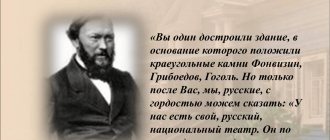“Effort is a necessary condition for moral improvement” (L.N. Tolstoy).
*
“If hygiene of the body is possible, then hygiene of the mind and character is also possible” (D. I. Pisarev).
*
“The soul, like the body, has its own gymnastics, without which the soul languishes and falls into the apathy of inaction” (V.G. Belinsky).
*
“No one can judge others until he learns to judge himself” (I. Goethe).
*
The number of brilliant children is directly proportional to the power of the parents' imagination. A.Batievsky
*
Is the family orchestra out of tune when the child plays first violin? Yu. Rybnikov
*
If only parents could imagine how annoying they are to their children! George Bernard Shaw
*
The first half of our lives is poisoned by our parents, the second by our children. Clarence Darrow
*
If a child suddenly becomes obedient, the mother is seriously scared - maybe he is about to die. Ralph Waldo Emerson
*
A person screams loudest about himself when he is in diapers; then gradually lowers his tone. H. Safrin
*
“When we are happy, we are always kind; but when we are kind, we are not always happy” (O. Wilde).
*
“Whoever thinks too long about doing good does not have time to be good” (R. Tagore).
*
“When a person does not know which pier he is heading towards, no wind will be favorable for him” (Seneca).
*
“A person’s virtue is measured not by extraordinary feats, but by his daily effort” (B. Pascal).
*
“It is not enough to have outstanding qualities and you also need to be able to use them” (F. La Rochefoucauld).
*
“The powers of knowledge should be directed towards what a person needs most: his moral self-improvement.” (Tolstoy L.N.)
*
“All the rules of decent behavior have long been known, the only thing that remains is the ability to use them.” (B. Pascal)
*
“The best manners are those who embarrass the fewest people.” (Jonathan Swift)
*
“A person who does not love his people and who does not like their specific image cannot love humanity.” (N.A. Berdyaev)
*
“For success in life, the ability to communicate with people is much more important than having talent.” (D. Lubbock)
*
“Goodness does not lie in not doing injustice, but in not even wanting it.” (Democritus)
*
“Goodness consists in mental activity consistent with virtue.” (Aristotle)
*
“Conscience as a requirement to be ashamed of one’s own shameful actions” (Democritus)
*
“Conscience is a moral norm realized by reason and experienced by feeling” (Seneca).
*
“The surest way to gain authority from people is to be useful to them.” (M. Enber Eschenbach)
*
“What gives us joy is not what surrounds us, but our attitude towards our surroundings.” (F. La Rochefoucauld)
*
“Reason is given to man so that he can live wisely, and not just so that he can see that he is living unreasonably” (V.G. Belinsky).
*
Aphorisms about studying for schoolchildren
• How can students succeed? Catch up with those who are ahead and do not wait for those who are behind.
*
• Exercise yourself with labors imposed on yourself voluntarily, so that later you will be able to endure involuntary ones.
*
• The beautiful is comprehended through study and great effort, the bad is assimilated by itself, without difficulty.
*
•. work as long as your young strength allows; you won’t notice how the hunched old age silently approaches.
*
• What is not clear should be clarified. What is difficult to create should be done with great perseverance.
*
• Smart people study in order to find out; insignificant to be recognized.
*
• Ignorance is of two kinds: one, illiterate, precedes science; the other, arrogant, follows her.
*
• The teacher must constantly ensure that children are not overloaded with activities.
*
• There is only one immortal force that survives dynasties, dogmas, classes, and that is the force of creative labor.
*
• Education is what remains after everything learned at school is forgotten.
*
• Most people have never been taught how to see through another's eyes, hear through another's ears, and feel through another's heart.
*
• An ignorant person has a great advantage over an educated person; he is always satisfied with himself.
*
• A child, like any person in general, is disgusted and unbearable by work in which he does not see any purpose.
*
• Repeated reading of books already read is the most reliable touchstone of education.
*
• An educated person differs from an uneducated person in that he continues to consider his education incomplete.
*
• Exams are when a fool asks questions that even a wise man cannot answer.
*
Material for primary classes “Aphorisms”
The expression “Balzac age” arose after the publication of Balzac’s novel “A Thirty-Year-Old Woman” and is acceptable for women no older than 40 years.
The expression “A healthy mind in a healthy body” was originally taken from a satire by the Roman writer Juvenal and sounded like this: “We must pray to the gods for a healthy spirit to be in a healthy body.” It is believed that this line is based on a proverb known in Ancient Rome: “A healthy mind in a healthy body is a rare occurrence.”
The Swedes themselves call a buffet a snack bar or a sandwich bar. The Swedish term for wall bars is translated as “frame with crossbars.” People in this country don’t know anything about the Swedish family either—the idea that Swedes, much more often than other peoples, practice cohabitation between two or more married couples is a fallacy.
The expression "Chinese literacy" corresponds to the English idiom 'It is Greek to me'. Similar expressions exist in other languages, often with different standards of difficulty. For example, a German expression appeals to the Spanish language, a Romanian expression to Turkish, a Turkish expression to French, and a Chinese expression to bird language.
The phrase “Elementary, Watson!”, which we are accustomed to associate with Sherlock Holmes, is never found in the original Conan-Doyle books.
In 1746, Tsarina Elizabeth Petrovna ordered the foreheads of criminals to be branded. This is where many popular expressions come from: “written on the forehead,” “branded with shame,” and “hardened criminal.”
Tyutelka is a diminutive of the dialect tyutya (“blow, hit”), the name for an exact hit with an ax in the same place during carpentry work. Today, to denote high accuracy, the expression “tail to neck” is used.
The most experienced and strong barge hauler, walking first in the strap, was called a cone. This evolved into the expression "big shot" to refer to an important person.
Previously, Friday was a day off from work, and, as a result, a market day. On Friday, when they received the goods, they promised to give the money due for it on the next market day. Since then, to refer to people who do not fulfill their promises, they say: “He has seven Fridays in a week.”
Previously, the nose, in addition to being a part of the face, was a tag that was worn on one’s person and on which notches were placed to record work, debts, etc. Thanks to this, the expression “notch on the nose” arose. In another meaning, the nose was a bribe, an offering. The expression “to stay with the nose” meant to leave with an unaccepted offering without reaching an agreement.
The possessive adjective “sharashkina” was formed from the dialect sharan (“trash, rogue, crook”). The expression “sharashkin's office” at first literally meant “an institution, organization of swindlers, deceivers,” and today it is used to mean simply an undignified office.
After ancient doctors discovered nerves in the human body, they named them by their similarity to the strings of musical instruments with the same word - nervus. This is where the expression for annoying actions came from - “playing on your nerves.”
In French, “assiet” is both a plate and a mood, a state. Presumably, an erroneous translation of the French expression caused the appearance of the phraseological unit “out of place.”
According to Christian custom, a priest confessed a person who did not have long to live, gave him communion and burned incense. As a result, the expression “breathing on its last legs” has been adopted to describe a sick person or a barely working device.
According to the ideas of some peoples, every unrepentant sinner, if a curse weighs on him, after death comes out of the grave in the form of a ghoul, vampire, ghoul and destroys people. To remove the spell, you need to dig up the remains of the deceased and wash the preserved bones with clean water. Today the expression “washing the bones” means analyzing a person’s character.
According to the Gospel legend, Pontius Pilate, forced to agree to the execution of Jesus, washed his hands in front of the crowd and said: “I am innocent of the blood of this Righteous One.” This is where the expression “I wash my hands” comes from to abdicate responsibility.
According to the ancient Jewish rite, on the day of remission of sins, the high priest placed his hands on the head of the goat and thereby laid the sins of the entire people on it. This is where the expression “scapegoat” comes from.
One day, a young doctor, invited to see a hopelessly ill Russian boy, allowed him to eat whatever he wanted. The boy ate pork and cabbage and, to the surprise of those around him, began to recover. After this incident, the doctor prescribed pork and cabbage to a sick German boy, but he ate it and died the next day. According to one version, it is this story that underlies the emergence of the expression “what is good for a Russian is death for a German.”
The small horny tubercle on the tip of the tongue of birds, which helps them peck food, is called pip. The growth of such a tubercle may be a sign of illness. Hard pimples in human language are called pips by analogy with these bird tubercles. According to superstitious beliefs, pip usually appears in deceitful people. Hence the unkind wish “peck your tongue.” .
When the son of the Roman emperor Vespasian reproached him for introducing a tax on public latrines, the emperor showed him the money received from this tax and asked if it smelled. Having received a negative answer, Vespasian said: “But they are from urine.” This is where the expression “money doesn’t smell” comes from.
When the Apostle Thomas was told about the resurrection of the crucified Christ, he declared: “...unless I see in His hands the marks of the nails, and put my finger into His wounds, and put my hand into His side, I will not believe.” Today, any person who is difficult to convince of anything is called “Doubting Thomas.”
The opening of the nail-like Eiffel Tower was timed to coincide with the 1889 World Exhibition in Paris, which created a sensation. Since then, the expression “highlight of the program” has entered the language.
Khrushchev’s famous phrase “I’ll show you Kuzka’s mother!” At the UN Assembly it was translated literally - “Kuzma’s mother”. The meaning of the phrase was completely incomprehensible and this made the threat take on a completely ominous character. Subsequently, the expression “Kuzka’s mother” was also used to refer to the atomic bombs of the USSR.
The expression “after the rain on Thursday” arose from distrust of Perun, the Slavic god of thunder and lightning, whose day was Thursday. Prayers to him often did not achieve their goal, so they began to talk about the impossible, that this would happen after the rain on Thursday.
The expression “Whoever comes to us with a sword will die by the sword” does not belong to Alexander Nevsky. Its author is the screenwriter of the film of the same name, Pavlenko, who adapted the phrase from the Gospel “Those who take the sword will die by the sword.”
The expression “the game is not worth the candle” came from the speech of gamblers, who spoke this way about a very small win that does not pay for the cost of the candles that burned out during the game.
During the rise of the Moscow principality, large tribute was collected from other cities. Cities sent petitioners to Moscow with complaints of injustice. The king sometimes severely punished complainants to intimidate others. This is where, according to one version, the expression “Moscow does not believe in tears” came from.
Koltsov’s 1924 feuilleton talked about a major scam uncovered during the transfer of an oil concession in California. The most senior US officials were involved in the scam. It was here that the expression “things smell like kerosene” was used for the first time.
In the old days, it was believed that the human soul was located in the depression between the collarbones, the dimple in the neck. It was customary to keep money in the same place on the chest. Therefore, they say about a poor person that he “has nothing in his soul.”
In the old days, chocks cut off from logs—blanks for wooden utensils—were called baklushes. Their manufacture was considered easy, requiring no effort or skill. Nowadays we use the expression “knuckle down” to mean idleness.
In the old days, village women used a special rolling pin to “roll” their laundry after washing. Well-rolled laundry turned out to be wrung out, ironed and clean, even if the wash was not of very high quality. Today, to denote achieving a goal by any means, the expression “by scraping, by skiing” is used.
In the old days, messengers delivering mail sewed very important papers, or “deeds,” into the lining of their caps or hats so as not to attract the attention of robbers. This is where the expression “it’s in the bag” comes from.
In the medieval French comedy, a rich clothier sues a shepherd who stole his sheep. During the meeting, the clothier forgets about the shepherd and showers reproaches on his lawyer, who did not pay him for six cubits of cloth. The judge interrupts the speech with the words: “Let's return to our sheep,” which have become winged.
In Ancient Greece there was a small coin called the lepta. In the Gospel parable, a poor widow donates her last two mites for the construction of the temple. The expression “do your bit” comes from the parable.
In the 17th century, by order of Tsar Alexei Mikhailovich, the distances between Moscow and the royal summer residence in the village of Kolomenskoye were re-measured and very high milestones were installed. Since then, tall and thin people have been called “Verst Kolomenskaya”.
In the 13th century, the currency and weight unit in Rus' was the hryvnia, divided into 4 parts (“ruble”). The especially weighty remainder of the ingot was called the “long ruble.” Associated with these words is an expression about big and easy earnings - “chasing a long ruble.”
“One scientist, having bought 20 ducks, immediately ordered one of them to be cut into small pieces, which he fed to the rest of the birds. A few minutes later he did the same with another duck, and so on, until one remained, which thus devoured 19 of its friends.” This note was published in the newspaper by the Belgian humorist Cornelissen to mock the gullibility of the public. Since then, according to one version, false news has been called “newspaper ducks.”
Quotes from great people about children
Children are flowers of life that are born with their heads down. (Antoine de Saint-Exupery)
*
If people say bad things about your children, it means they are saying bad things about you. (V. Sukhomlinsky)
*
Children have neither a past nor a future, but unlike us adults, they know how to use the present. (LaBruyere)
*
Children immediately and easily become accustomed to happiness, because they themselves are by nature joy and happiness. (V. M. Hugo)
*
I don’t know anything more beautiful than a worthy happy mother with a small child in her arms. (T. G. Shevchenko)
*
Most of us become parents without ceasing to be children. (Minion McLaughlin)
*
In a good family, there is never any punishment, and this is the most correct way of family education. (A. Makarenko)
*
If you want to raise good children, spend half as much money and twice as much time on them. (Esther Selsdon)
*
Examples of aphorisms from literature
Of course, it is literary works that are a real storehouse of aphorisms. Most of the catchphrases came into our speech precisely from the pages of books.
Well, for example, let’s take a work familiar to every high school student - “Woe from Wit” by Alexander Griboyedov. After all, everyone is familiar with the phrases:
I would be glad to serve, but being served is sickening. The legend is fresh, but hard to believe. The houses are new, but the prejudices are old. Happy hours are not observed. The smoke of the Fatherland is sweet and pleasant to us
But in Alexander Sergeevich Pushkin, most of the lines that became aphorisms are dedicated to love:
Love for all ages. He who has loved once will not love again. The less we love a woman, the more she likes us. But I, loving, was stupid and dumb.
But none of the Russian writers in this regard can compare with Ivan Krylov. Almost every fable (what is this?) ends with an aphorism:
And you, friends, no matter how you sit down, you are not fit to be musicians (Quartet). Eh, Moska, she is strong, she barks at an elephant (Elephant and Moska). The powerful always have the powerless to blame (The Wolf and the Lamb). A helpful fool is more dangerous than an enemy (The Hermit and the Bear). Don’t spit in the well, you’ll need to drink the water (Lion and Mouse). When there is no agreement among comrades, things will not go well for them (Swan, cancer and pike).
But, of course, not only Russian literature is strong in aphorisms. Quite a few of them came to us from the works of foreign authors:
A true friend is found in need (William Shakespeare). A rich man can have any principles (Mark Twain). To be kind is easy, to be fair is difficult (Victor Hugo). The darkest hour is before the dawn (Paulo Coelho).
Catchphrases (material for a Russian language lesson in 3rd grade)
“Where the eyes are looking” In order to avoid the test, Anton was ready to run away from the school about fifty miles, to go wherever the eyes are looking.
*
“Running headlong” They ran headlong from the forest Styopa and Fedya: They saw a bear in broad daylight in a raspberry field.
*
“To lie about three boxes” Egor went mushroom hunting, He collected them well: He found two rotten Morels, And he lied about three boxes.
*
“Bite your tongue” Shut up, Petrus! - They say. Bite your tongue! - They say. He bit his tongue and began to scream louder.
*
Game Library Riddles; Fold riddles “Guess the catchphrase from the illustration” Speech exercises
*
You won’t find any friendlier relationship between these two guys in the world. They usually say about them: You can’t pour water on them. You can’t spill them, you can’t spill them.
*
We walked the town literally up and down. And we were so tired on the road that we could barely move our feet, dragged our feet, dragged our feet
*
Preschool pedagogy with the fundamentals and methods of education and training. Textbook for universities. Third generation standard. 2nd ed.
*
Aphorisms are a treasury of human wisdom
September 2, 2019
Hello, dear readers of the KtoNaNovenkogo.ru blog.
Brevity is the soul of wit!
Almost every person knows this famous phrase of Anton Pavlovich Chekhov (in Russia absolutely for sure). And most regularly use it in their vocabulary.
And today she will be our “guiding star”. Because, firstly, we will talk about aphorisms, and this is one of their clearest examples.
And, secondly, following the behest of Anton Pavlovich, we will try to briefly and clearly (and hopefully, talentedly) explain what this term is.
How aphorisms appear in our vocabulary
Famous cultural figures often acted as creators of aphorisms. Theater fans often repeat the phrase of the brilliant director K.S. Stanislavsky: “The theater begins with a hanger.” Politicians did not stand aside: “Gnaw the granite of science with your young teeth!” (Trotsky); "Life has become better, life has become happier!" (Stalin).
Composers, painters, sculptors, actors, scientists - many of them became famous not only in their professional activities, but also thanks to their caustic and ironic statements. For example, the brilliant physicist Lev Landau created a popular phrase that has become popular among the people: “A good deed will not be called a marriage.”
There are aphorisms whose authorship is unknown. They were created spontaneously, and began to be used among the people as proverbs. “A penny saves the ruble”, “It’s clear - a horse, straight away!”
How did the concept of “aphorism” appear?
In Greek, this word meant “definition.” Only this is not a scientific, but a literary definition. It contains an original thought that determines a feeling, deed or action.
A distinctive property of an aphorism is its logical completeness, thanks to which it is well remembered and literally “embedded in memory.”
The aphorism can be short, for example: “Brevity is the sister of talent” (Chekhov). Such aphorisms are often used in speech because they are easy to remember.
But the aphoristic phrase can also be expanded: “If you are lonely, when you are alone, then you are in bad company” (French writer Jean Paul Sartre). This statement will be appreciated by people with a philosophical mindset who like to think alone.
Aphorisms from works of art
Aphorisms from literature are often quotations, that is, verbatim repetition, excerpts from the text. But not every quote can become an aphorism. Only apt, laconic statements containing a complete thought deserve this name.
Many catchphrases are quotes from movies. People's favorite comedies directed by Leonid Gaidai are simply a treasure trove of such quotes: “Only aristocrats and degenerates drink champagne in the morning,” “Our people don’t take a taxi to the bakery.”
Aphorisms born in literary works are included in the golden fund of national literature. For our country, examples of statements that have gone viral are the words of the classics of Russian literature:
- Nekrasov (“It’s just a pity, neither I nor you will have to live in this beautiful time”),
- Pushkin (“Genius and villainy are two incompatible things”),
- Lermontov (“Love was without joy, separation will be without sadness”),
- Griboedov (“And who are the judges?”).
- Saltykov-Shchedrin (“I wanted something: either constitutions or stellate sturgeon with horseradish”),
- Chekhov (“A smart man loves to learn, but a fool loves to teach”),
- Bulgakov (“Manuscripts don’t burn”),
- Schwartz (“Children need to be pampered - then they grow up to be real robbers”),
- E. Krotky (“Children are the flowers of life. The main thing is not to let them bloom!”),
- Zhvanetsky (“Alcohol in small doses is harmless in any quantity”).







